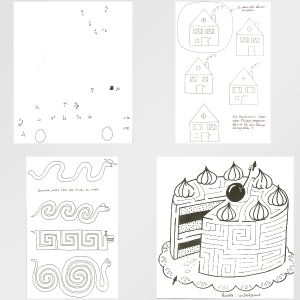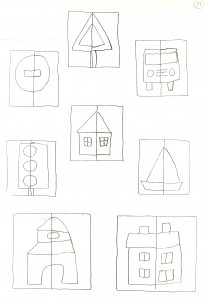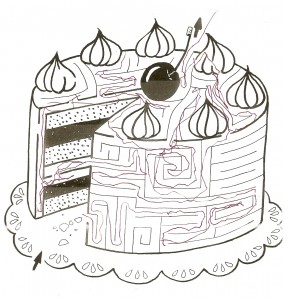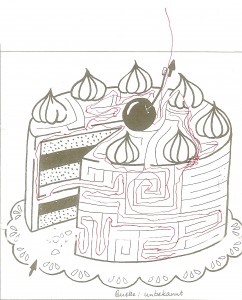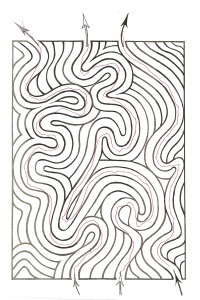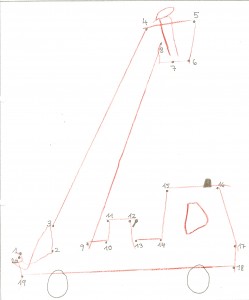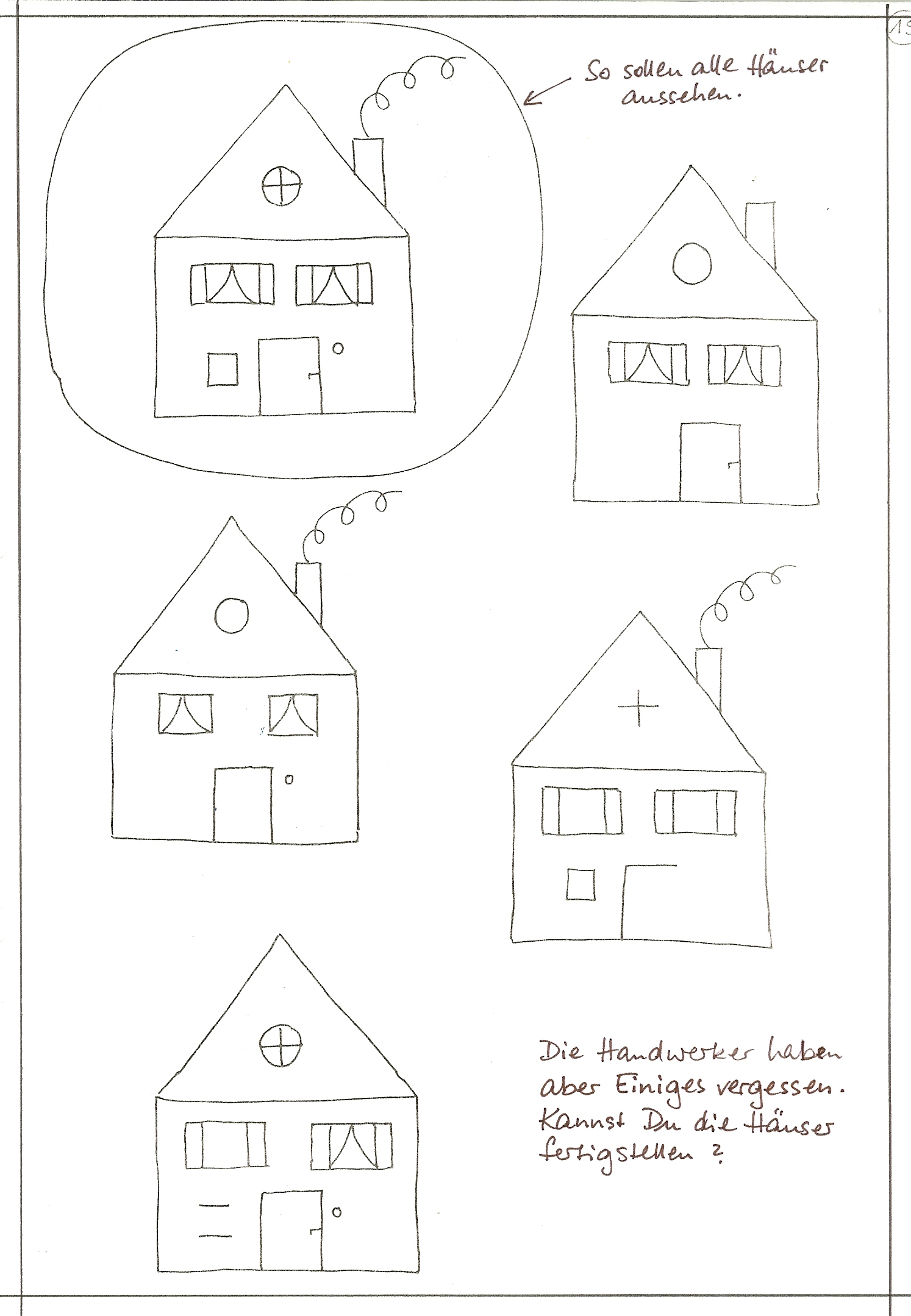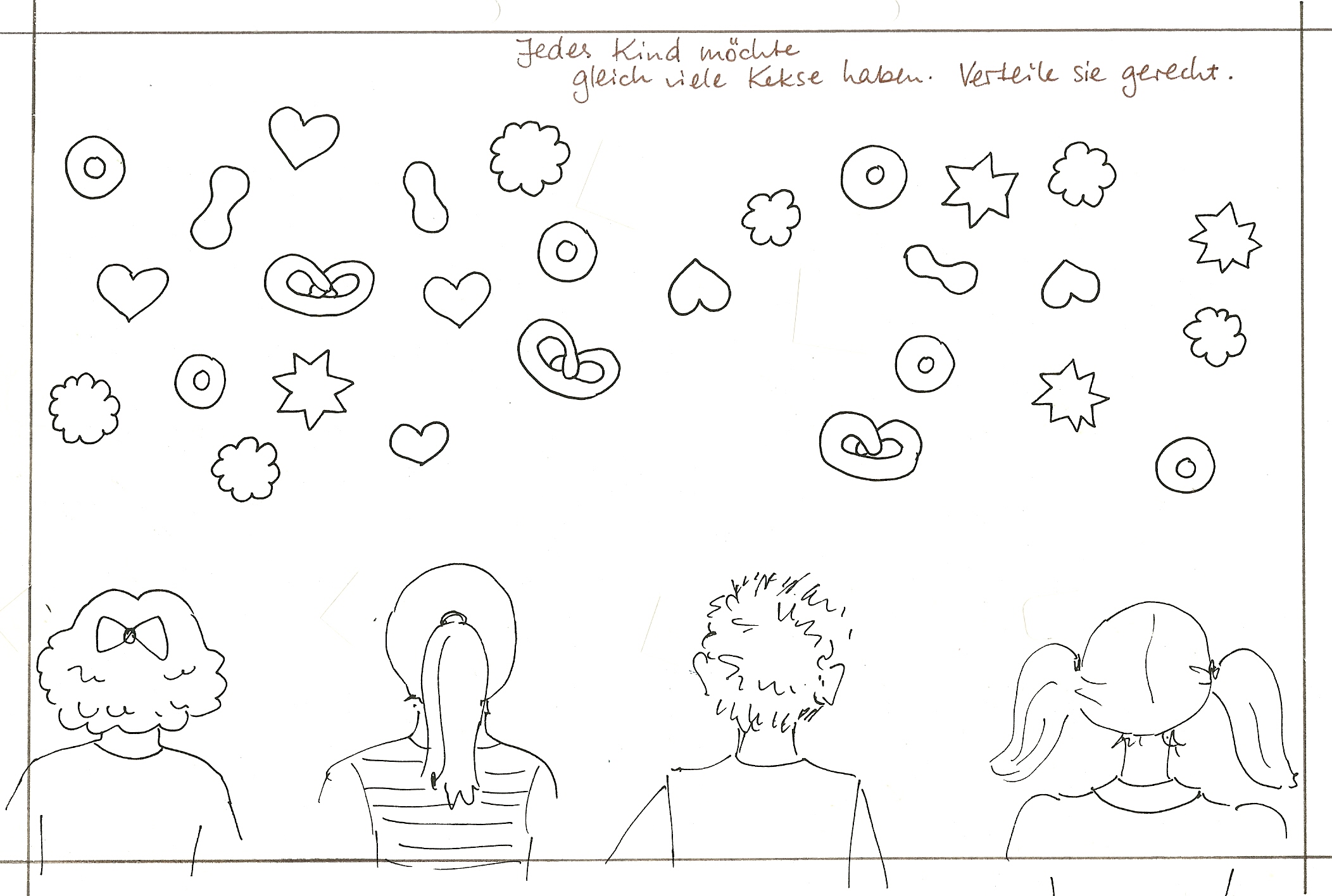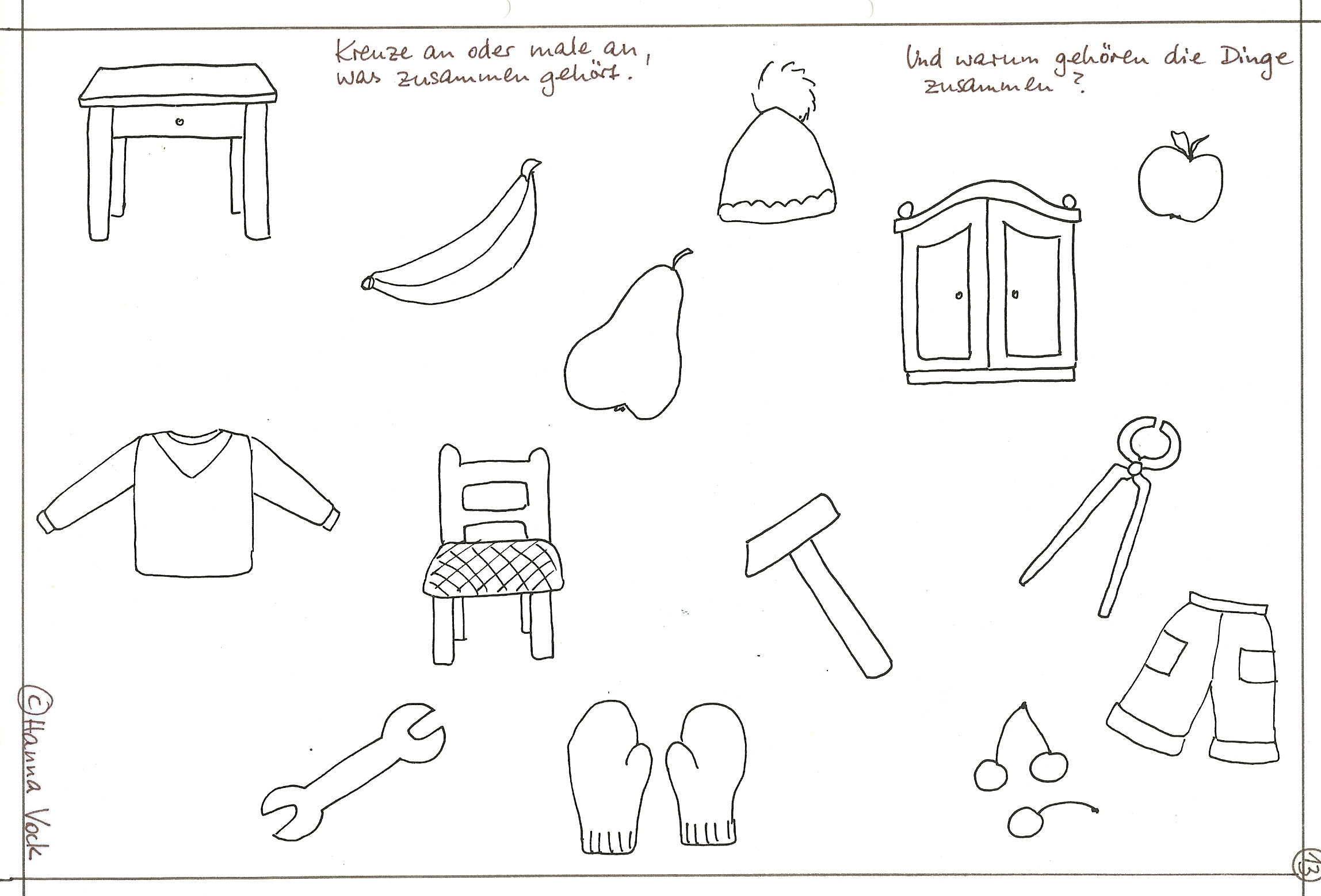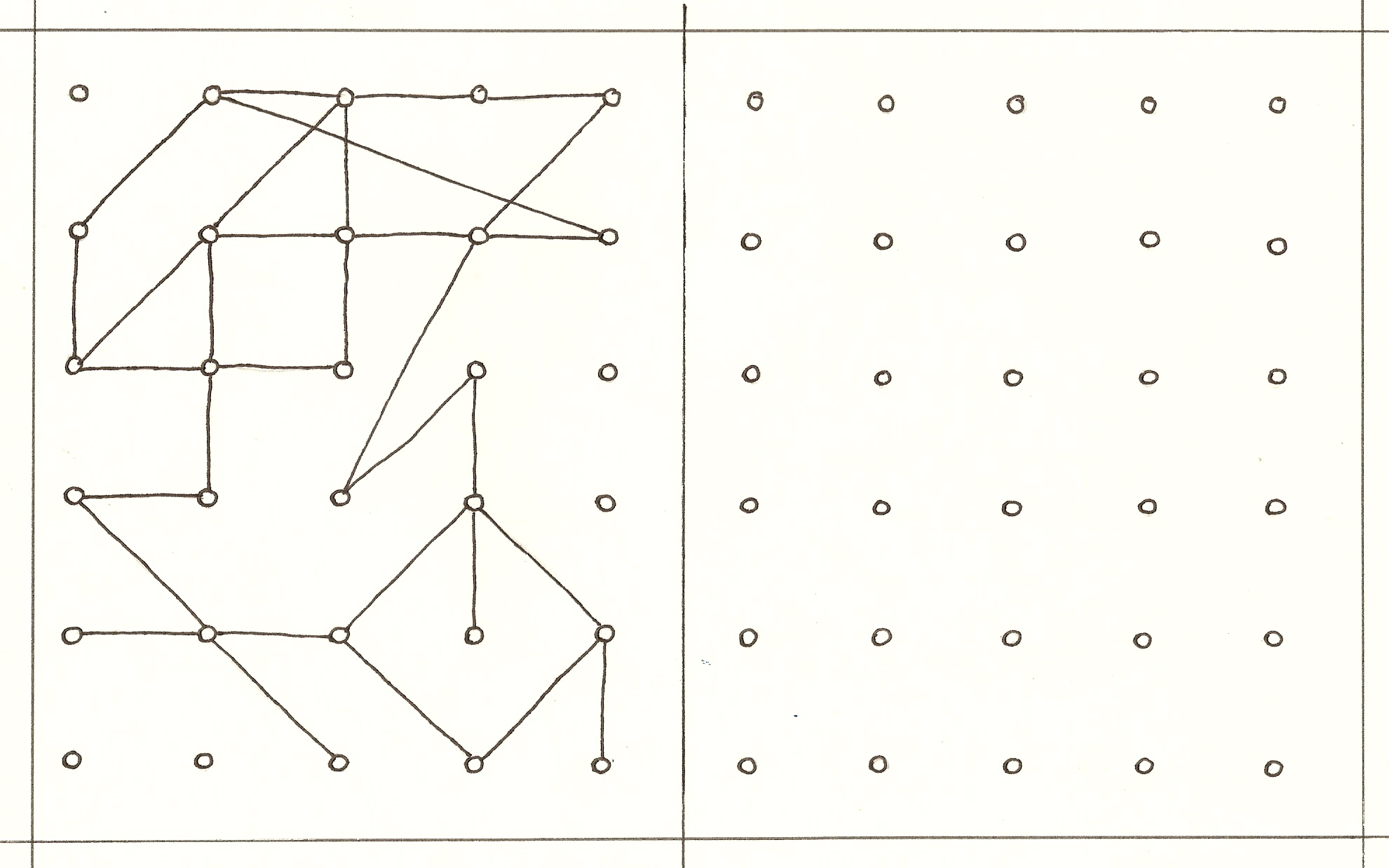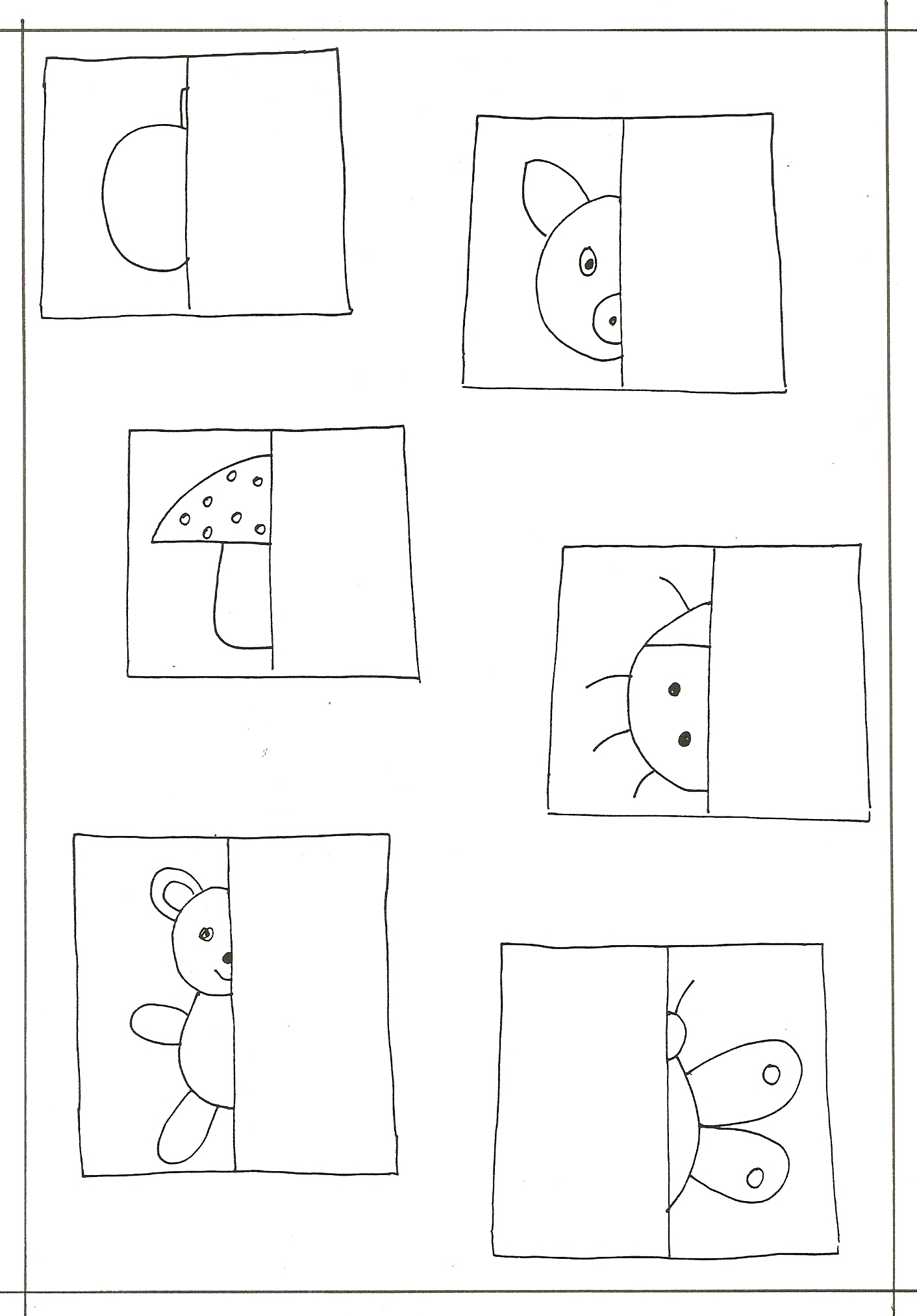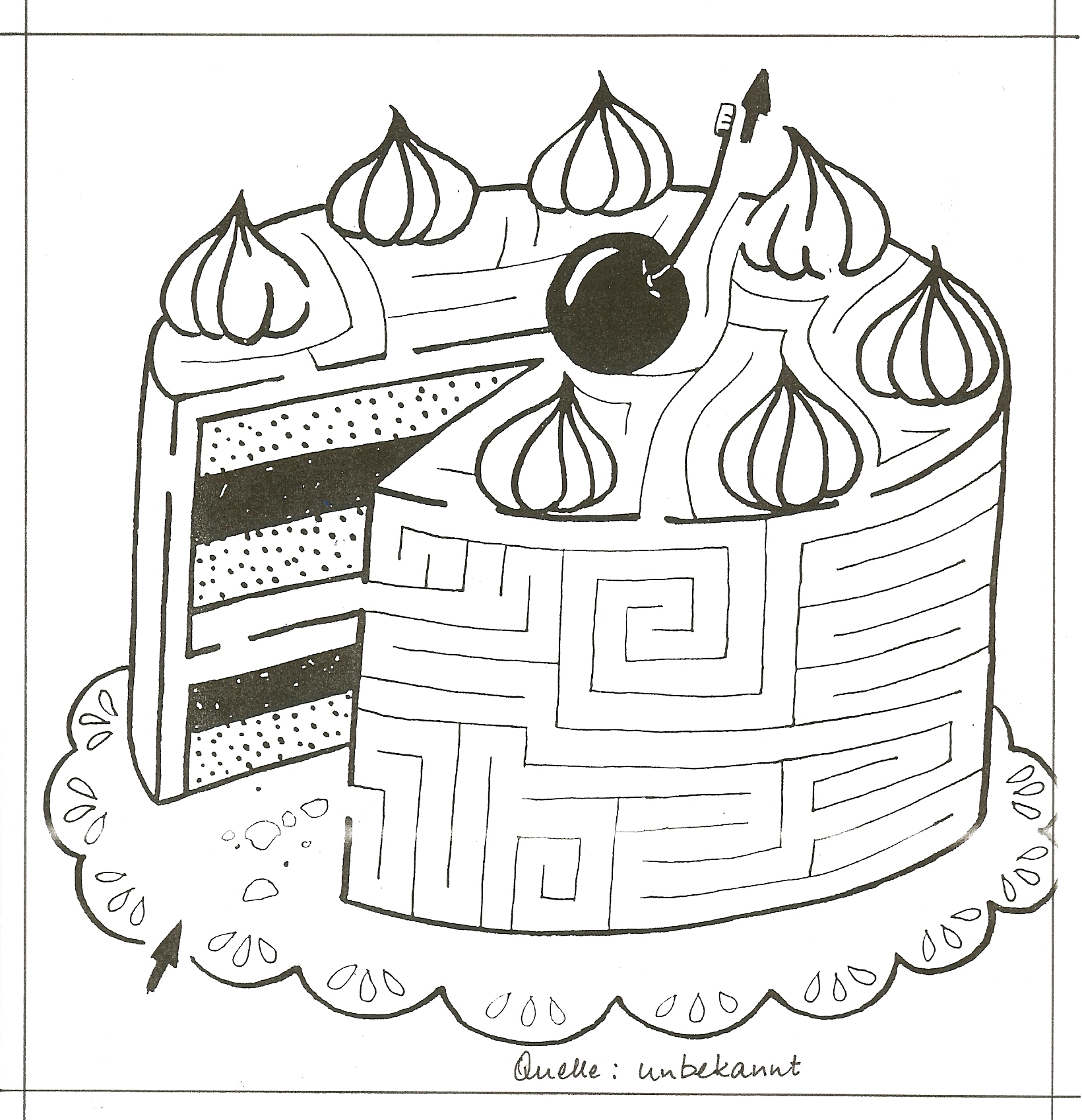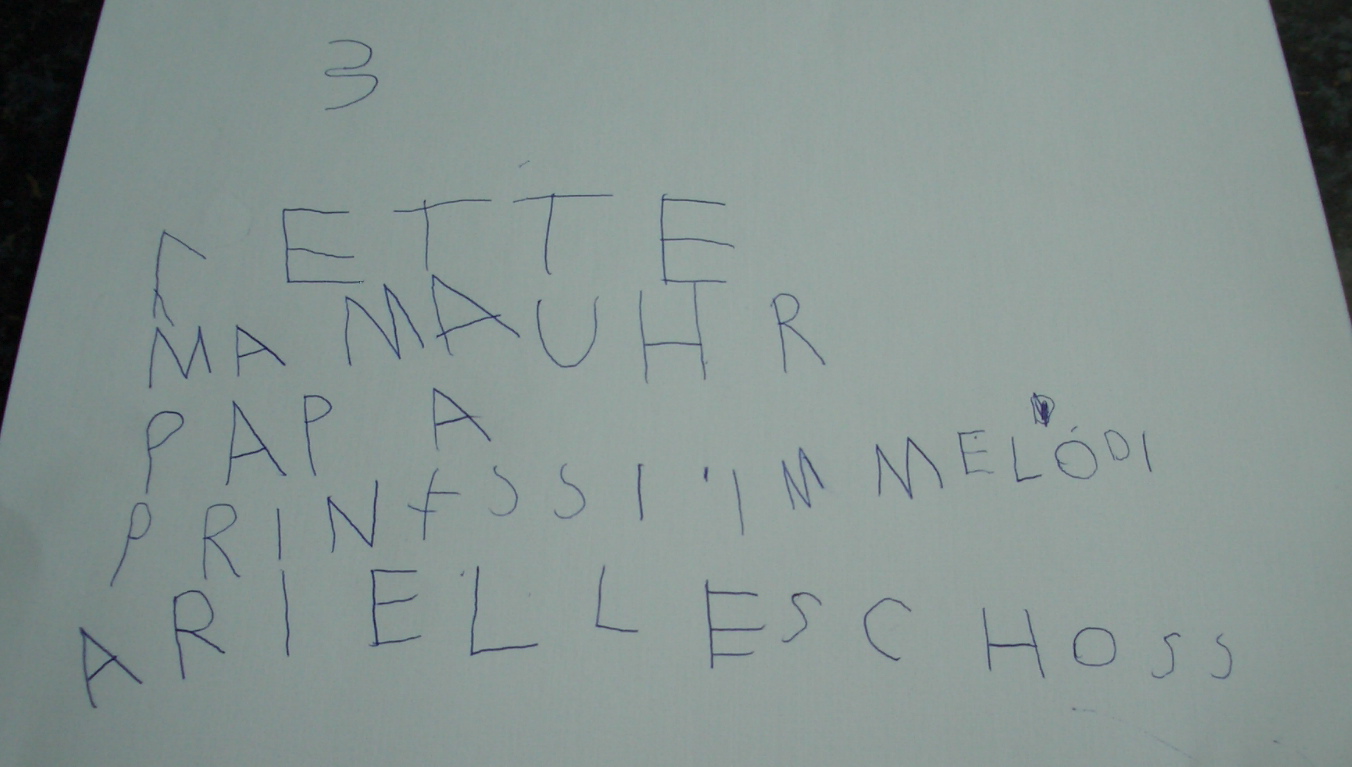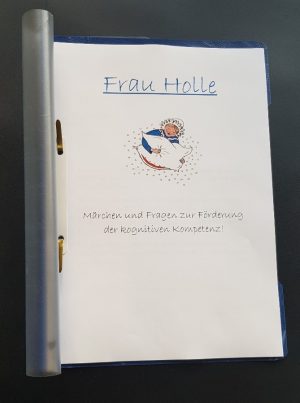by Gabriele Drescher-Krumrey
In the „Power Girls´Club“, the eight oldest girls in our kindergarten had already gained experience of what it’s like when they can only go on a discovery tour together with girls. During the first six lessons of the club, they had dealt thoroughly with the subject of „What is a powergirl?“, and they had already done a scientific experiment (Carrot Experiment).
The Power Girls´ Club will now be continued with the 7th Club lesson and the new topic „Professions“.
You can read more about why I founded this club and which goals I pursue with it here. Parallel to it exists the „Club of the Gentle Boys“ led by another colleague.
… in a nutshell …
The author has developed and led a girls‘ learning club for one kindergarten year. Some of the weekly club lessons are described in this article.
All colleagues who want to try something similar will find here (and in the other contributions of the author, to which the text refers) not only suggestions, but also a complete concept and a basically reworked process planning for the promotion of especially gifted girls.
On this basis they can gain new and own experiences and offer valuable learning incentives to the girls.
During the IHVO Certificate Course, which I completed, we had the task of observing a presumably particularly gifted child particularly intensively. I had decided in favour of Lina.
In kindergarten Lina stood out for her very calm, reliable, persistent, prudent, observant, social and also ambitious behaviour. Lina understood and learnt particularly quickly, but was initially quite shy and insecure in the group. During the first six club hours she already blossomed.
She has significantly increased her self-confidence and independence in our club lessons together. She now seems relaxed and is always curious about what will be experienced, tried out and worked out together in the next lesson.
Lina (now 6;2 years old) is still very careful and correct in her work, although she looks at the other girls much less often than before. It seems that Lina now feels confident that what she has thought about is well thought out. She carries out the tasks with her own ideas. I rarely notice that she sits in front of the task and needs time to get started.
She stands out through her alert, open gaze. Her expressions are constructive and are introduced spontaneously or deliberately. She grasps tasks immediately and can now contribute to the topic very quickly, loudly and appropriately.
There are only seven girls left in the club, as one has moved away with her family. All seven girls have clearly gained security in the three months of club time so far, are able to communicate their interests clearly, are courageous to ask questions and enjoy finding answers together.
Elise (6;0) and Laura (5;6) have learnt not to always be immediately sparkling with questions and answers. They can also wait until other girls have put forward their ideas.
In this group Ayşe (5;3) often cannot follow the club hour contentwise. This is mainly due to her still weak knowledge of German. She gets bored more often, because she does not understand the conversations in the club sufficiently. In the practical part, during movement exercises or while painting, she participates more actively. She uses her good observation skills to orientate herself in the task at hand.
Ayşe is slightly tired, yawns a lot and usually lies on the floor or walks aimlessly through the gym. The girls accept Ayşes behaviour without remarks, she is part of the group.
What opportunities do I want to offer the girls?
1. in the area of self-confidence:
-
- To clearly recognise their own abilities and needs.
- To recognize, how they can use their interests and abilities for themselves.
- To recognize how they can receive support through questions.
- To recognise what else interests them and gives them pleasure.
- To recognize how they can show their environment what they are made of.
- To recognize how one can learn with each other and from each other.
2. in the field of language:
They can practice,
-
- to exchange ideas,
- to try out and apply their linguistic competence in a targeted way,
- to listen in the group, to record and implement what they have heard,
- to converse in a topic-oriented way,
- to translate spoken words into writing.
3. in the field of knowledge of occupations:
Here are the goals:
-
- The girls expand their knowledge by deepening the current group topic („researchers, artists and inventors, that´s what we children are interested in!“).
- They expand their knowledge about the professions of their parents, get to know the names and contents of the professions.
- They get to know women’s and men’s occupations.
- They formulate their first own career aspirations.
The following activities are planned:
Painting, handicrafts,
talk, sing, shout, scream,
talk to each other, listen to each other, exchange ideas,
play,
jumping, running, dancing, romping,
meditate, dream, feel, sense,
think, ponder, think up,
do nothing, just being there,
invent, observe, recognize,
visit, explore,
read aloud, read,
write, rewrite, copy,
play and perform theater,
show yourself, present yourself.
The Club Hours
In order not to go beyond the scope of my (IHVO) homework, I will describe only some of the club lessons in more detail.
The description of the 1st to 5th club hour can be found in: What is a Power Girl?,
the description of the 6th clubhour can be found in: Carrot Experiment.
7th club hour:
Which professions do we know?
Game: A wonderful pillow fight.
Homework: What profession do mummy / daddy have?
In the gym we sit in a circle on the floor, in the middle there is a candle, in the background quiet meditative music plays.
After the longer Christmas break I want to have an intensive conversation with the girls. They have experienced a lot and talk in detail.
The group is very restless, the Christmas experiences are still very current and the telling takes quite a while.
Laura (5;6) got a children’s Bible for Christmas and brought it with her. She is enthusiastic about the stories. I start to tell the Christmas story, and we gather it together with a lot of fun.
Then we talk again about what it means to be a power girl. Here are their remarks:
„Because we work well.“
„Because we train.“
„Because we think well.
„Because we try things out.“
„Because we practice.“
„Because we smell good.“
„Because we eat and drink a lot.“
„Because we learn.“
„Because we work the bones and muscles.“
Formulating their own ideas further motivates the girls for their club.
Movement game: A wonderful pillow fight.
We place ourselves in a circle. The girls have discovered something they don’t know yet: I filled a duvet cover and two pillowcases with balloons. The girls can use it to try out different games.
First I throw them one of the pillows, they immediately play with it. So I bring the second pillow into play and the game becomes more lively.
After a few minutes I add the duvet cover and quickly the game develops in such a way that all the girls throw themselves onto the balloons and roll on them.
Finally I ask: „Who can let themselves fall on the „balloon mat“, forward or backward?
Lina does not hesitate and immediately drops courageously onto the balloons. Some are not so sure if they should dare, but in the end all the girls try it out. Even when it comes to being covered with the balloons in the covers, Lina, once so shy, leads the way.
We finish the game and sit back in the circle. The girls are happy and relaxed. Now I begin my transition to the subject of professions. I tell them that professions will be the motto of our carnival celebration, which is why we want to deal with professions.
I ask if they know anything about occupations and already know occupations. They are reserved, so I ask them about my profession. Most girls know the job title „Kindergarten teacher“, Ayşe she gets to know again.
That’s what the girls think of the job description:
„Playing.
„To help the children learn.
„Handicrafts.“
„Singing.
„Think about what the children want.“
I ask the children if they know any other professions.
Lina knows her mother’s profession, she is a music teacher.
Laura doesn’t know the name for her mother’s profession, but she can describe exactly what her mother does: „She translates poems – I don’t know exactly what that is – from Spanish to German.
All the other girls think about it, but probably don’t dare to say anything or don’t know their parents‘ professions. I leave it at that and hand out two worksheets to each girl.
On it „Mama“ or „Papa“ is to be supplemented. They should take the sheets home with them and have their parents enter the job title.
The girls should inform themselves about the professions of their parents and then introduce them to the group.
Lina, Greta (6;0) and Laura immediately write „Mama“ and „Papa“, Elise (6;0) and Melisa (5;8) shout „I can’t do that“, but look at the other girls, shout „I already know“ and also write. Ayşe behaves quietly and also writes. I can’t tell if she is writing it on her own or if she is orienting herself towards the other girls.
They like the „homework“. Elise has doubts whether she can remember everything her parents will tell her. The others are just happy that they have a homework assignment.
8th club hour:
What profession do mummy and daddy have?
Game: We jump our name: We jump our name and the professions of our parents.
I ask how the girls are doing; some were sick and I was too.
My colleague made a pantomime game with my club last week. The girls tell me that they have pantomimed the professions they know.
When I ask about the „homework“, it turns out that three girls did not bring their leaves back with them. Elise immediately says: „But I know what my mum does.“ And Greta says very quietly: „I also know what my mum and dad work.“
The girls have their worksheets, if available, in front of them and we talk about what they have experienced.
I give you excerpts of this here.
Lina begins and reports, and I read out what the parents have written about it.
All girls can imagine the profession of the music teacher; Lina reminds the girls of the music teacher who worked for us in the kindergarten for a while.
Linas father is a software developer; this is more complicated than that. But all children know computers and computer games, so they can make a connection to what Linas‘ father wrote down: „I work on the computer and create programs so that the computers work well“.
Greta’s father is a dentist and her mother is a dental assistant. The girls know these professions very well, because a dentist regularly comes to our kindergarten with her dental assistant. The children also go to the dentist´s office.
Melisa’s father is a machine fitter. All girls have a hard time imagining this profession and Melisa can tell little about it, so I have to supplement what I know. Her mother is a housewife, and we think together about the tasks a housewife has. The result is that a housewife also has many different tasks.
Since I know that Ayşe´s mother is a housewife too, we can include Ayşe well. She thinks with us about what her mother has to do at home. Her father is a heating engineer. I ask her to ask her father what he has to do in his job, because I think it is important that the girls can personally tell something about the jobs.
Elise can explain her mother’s profession very precisely, but she doesn’t know the job title (pharmaceutical consultant). She doesn’t know her father’s profession and so she also gets the task to ask him.
Tina’s mother is a neurologist, her father a psychiatrist. Tina can explain exactly what the parents do in their job and where they work.
Laura tells that the name of her mother’s profession is very long, she is a literary scholar (in German Literaturwissenschaftlerin), which Laura alone has copied onto the worksheet. The father is a musician, Laura shows pantomimically how he drums.
The girls, who have information about their parents‘ professions, are visibly proud to share their knowledge. All the girls listen to the reports with interest.
Then I ask the girls to paint the activity of their parents.
They start immediately and everyone has ideas on how to portray the activity.
The pictures show that they have understood the explanations of the parents and our reflections in the group and have thus expanded their knowledge.
Lina says: „I paint my dad from behind, sitting at the computer, it’s quite difficult.“
I ask the children to also write the job title. Lina also copies the whole addition from the worksheet. Then she doesn’t have time anymore to present the work of her mother.
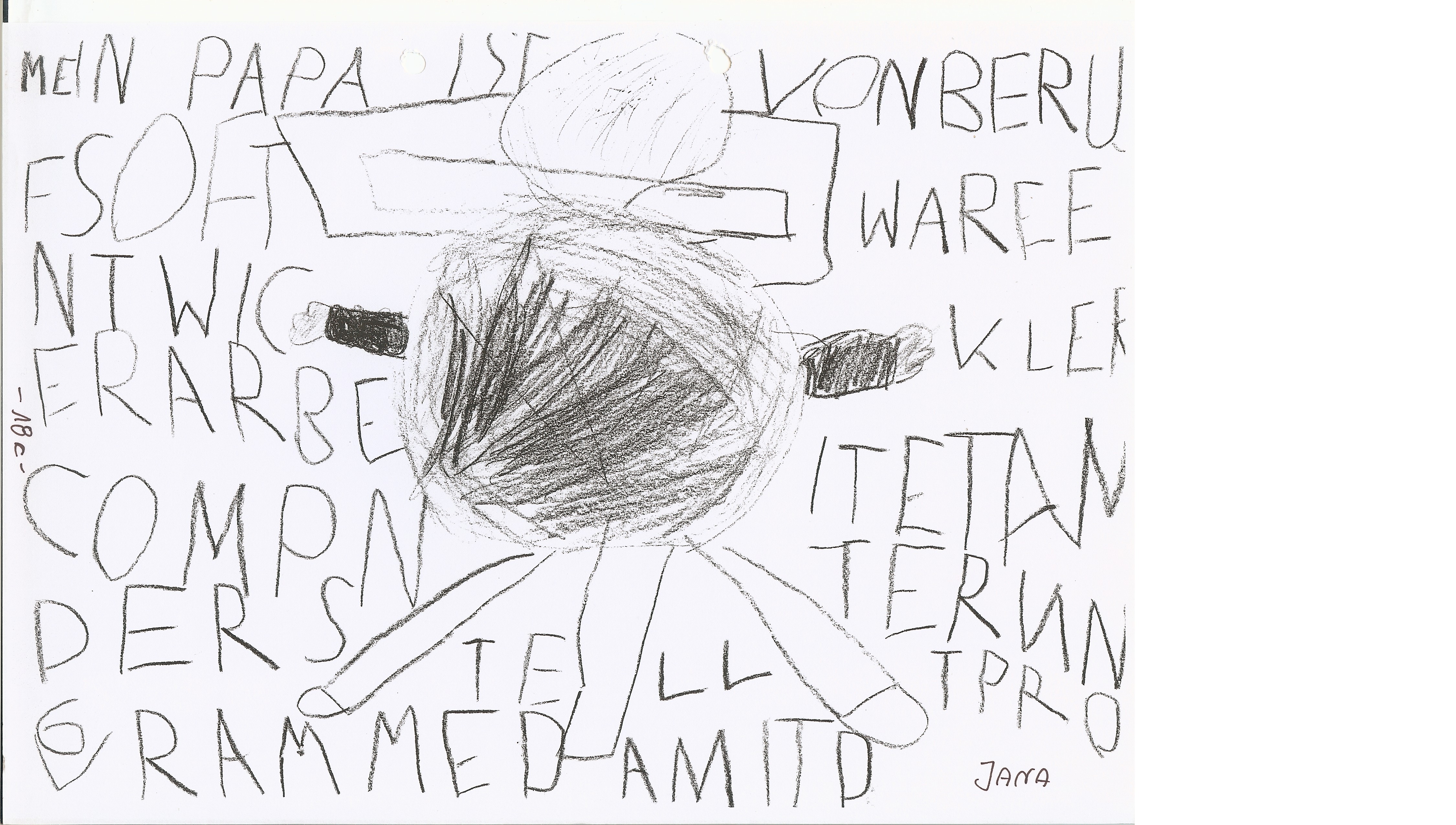
Lina´s picture: Software developer.
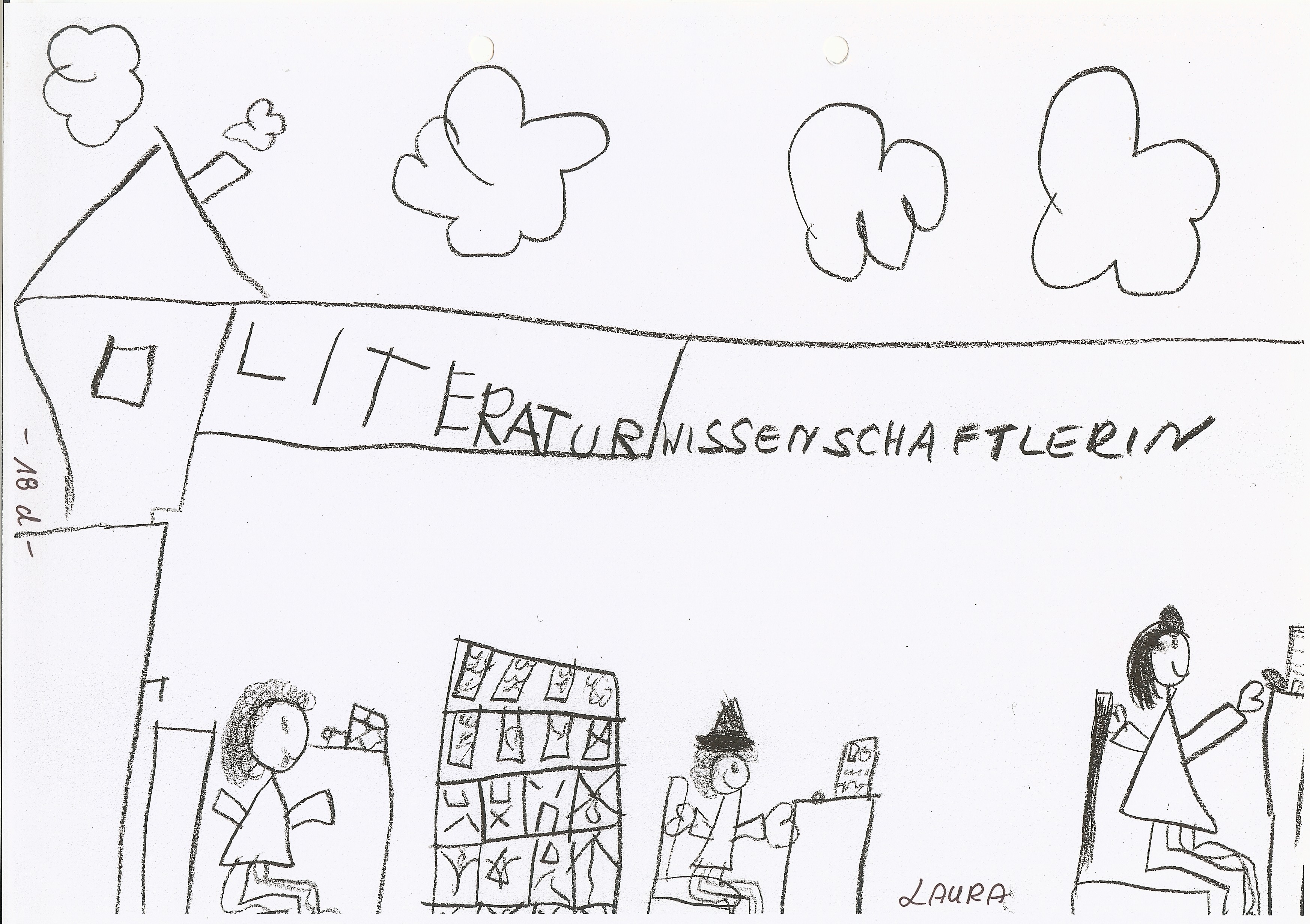
Laura´s picture: Literary scholar
The comparison of the two pictures shows that Laura has drawn very beautifully and differentiatedly and accurately and that she can already write clear letters – her current preferred way of expressing herself is clearly drawing. Then she no longer wanted to write the second part of the job title herself, I should add.
Lina’s drawing is rather schematic, but she writes the whole page full. Obviously her current interest lies in writing.
Trampolining
At the end of this club hour I offer a movement game. We have purchased a new trampoline which I would like to use. After a few rounds of free experimentation, I set the girls the task of jumping their names the way they hear the syllables and how they emphasize them. Afterwards they are to convert the professions of the parents into jumps.
Lina immediately understands the task, she promptly says her name in syllables. The other girls follow her example.
They are happy that the job titles are longer and that they can jump more often. They do this enthusiastically and with many repetitions.
The „word jumping“ is supposed to promote a holistic feeling for language in the girls.
Now it is about jumping any words. Even as she waits, Lina thinks about which words she could skip. I observe that Lina has always been curious and waiting for the new task. She has been able to develop so much personal power and strength in recent months that she clearly shows and uses her great willingness to learn.
These exercises were also a lot of fun for Ayşe. She hasn’t thought about any of her own words, but the recording and carrying out of the other children’s words will certainly help her feel for the language.
9th club hour:
What else can I discover about the professions of my parents?
Game: Form words to the first letter.
There are six girls again.
The topic today is: What else can I discover about the professions of my parents?
I take up the contents of the last club lesson and ask the girls who can imagine a profession other than that of the parents. They think briefly and say that they know no other profession.
I suggest choosing a girl in order to talk more about her parents‘ profession. They agree on Greta (dentist / dental assistant). They immediately think of the right profession and we collect the information.
The three children who had not filled out a worksheet at the last hour of the club worked it out with the help of my colleague the day before. Elise’s mother asked us to fill out the worksheet with her daughter. We did not reach Ayşe´s and Nora’s parents to ask them personally for their cooperation, so I took the information from our documents.
So all the club girls have similar prerequisites to continue working with their parents‘ professions.
Today Elise explains her father’s profession to us. He is a craftsman and works on building sites. When the house is nearly finished, he is responsible for dry construction. Together, we think about what he is going to do in the house and come up with something: Laying floors, cladding ceilings.
Ayşe unfortunately has no information about her father’s profession yet, as her mother could not explain the profession to her either. So we consider, what the job title heating engineer says over the occupation. The children know the heater and know how important it is for us. Thus it succeeds to include also Ayşe with.
Letters!
In the club hours I noticed that it was great fun for the girls to write their names, the date or even the topic on their picture.
So I make the suggestion to look at the first letter of the job title on the old worksheets and circle it. Then each girl should introduce her letter, and together we will think about which professions start with this letter.
Lina, Elise, Nora and Melisa also find the other professions with the same initial letter, for example: music teacher – machine fitter and housewife – heating engineer.
On the floor of the gymnasium I distribute the letters of the alphabet (painted large on DIN A4 sheets).
The girls should select the first letters of their mother’s and father’s profession and introduce the two letters.
Game:
Now only the letters are on the floor which they have already got to know. There is music with a fast rhythm. The girls move freely in the room. I stop the music and say a letter where everyone should gather.
When all the girls are gathered by the respective letter, the group considers which professions begin with this letter and which other words they know with this initial letter.
I observe that, despite the fast music, the girls keep slowing down in their movements, looking at the letters and thinking. They seem to think about which words belong to which letter.
Lina is also very active in this game and finds many words. I see her looking closely at the girls in the group, looking around the gym and looking out the window to find new words.
The group motivates each other, so they construct new words to find out if their word creates a meaningful word, for example:
M-musicians / H-husicians.
Through these experiments they develop a better understanding of the language. The foreign children of the club, Melisa and Ayşe, notice with this playful contact with language that also the German children must try something out, in order to come to the correct result.
When the time is up, the children are disappointed that we are already coming to the end. Now the girls express the idea to create a game for the other children of the kindergarten group: With the help of the worksheets, the painted pictures and the large-format letters, they want to present a narrative game about professions.
I took up this idea in the 13th and 14th club hour. We created a memory game.
10th club lesson:
Can girls and boys learn and practice the same professions?
Game: Make-up like „Dumme Augustine“ (Silly Augustine – Character from a popular children’s book, she is a clown),
I explain to the children that I brought along a picture book for this club lesson: „Die dumme Augustine“ by Otfried Preußler and Herbert Lentz.
Contents of the book:
The story tells of the „Silly Augustine“ who wants to perform in the circus so much. But her husband, the „Silly August“, doesn’t want it. He tells her to do her household chores and take care of the children.
He also says that she can’t play the role of the clown at all.
Then the „Silly August“ gets toothache and has to go to the dentist for treatment while the circus show is on. The „Silly Augustine“ takes the opportunity and plays the clown role of the „Silly Augustine“ in the circus ring. The audience and the circus director are enthusiastic about her performance. „Silly August“ comes back just in time to experience the success of his wife. He is amazed and happy and can no longer say: „You can’t do that“.
So they decide to do all the housework, looking after the children and, of course, performing in the circus together.
The club girls look at the picture book thoroughly together, I read the text. Only Lina already knows it, but thinks it was a long time ago; it’s new for the other girls.
The girls want to know why the „Silly Augustine“ is called that. I explain to them that „Silly August“ is a clown role in the circus. We think about what other clowns there are and find only the Pierrot. So I suggest that everyone consider until the next club hour and ask which clowns they or their families know.
While looking at the pictures, the girls talk excitedly about what they see and comment on what they find „silly“, for example that the „Silly Augustine“ always has to do all the housework alone and is not allowed to perform in the circus.
They have obviously already developed a good feeling that they would be restricted if certain activities were not allowed to them because they are girls.
Then we exchange ideas.I don’t have to ask many questions or contribute many thoughts to show the girls clearly that girls and boys as well as men and women can learn the same thing. The conversation about this is very lively and clear.
Tina and Laura say that mum and dad work in their jobs and in the household. Elise confirms this and Greta nods in agreement. Melisa tells that her mom works at home and that her dad is sleeping or watching TV when he is at home. Lina says: „My mum works at home, but when dad is there, he also works at home“. Ayşe is unfortunately missing from this club hour.
This „Power Girls´ Club“ has smart, curious and
self-confident members!
For our planned „storytelling game of professions“ we still deal with the terms „male“ and „female“.
I show and explain the prepared worksheets to them.

All the girls paint and copy it on a card. Here is Lina’s result:

Make-up
Finally the girls put on make-up (or have me do it for them) until they look like the „Silly Augustine“.
They look again and again into the book and discover another colour, which should be in their face like the Augustine.

Greta doesn’t know if she should or may put on make-up, and Elise knows that she is allergic to make-up. Nevertheless, the two of them are not bored, but participate with tips and assistance in the make-up of their friends.
Short interim evaluation
The previous offers were very well received by the girls, who are always excited with curiosity and motivated to discover and try something new.
Lina says every hour how she is looking forward to the school and wants me to do more homework as well.
Elise and Laura confirm this, and Elise surprises me with the request: „I want to practice writing much more“. Lina, Laura and Melisa also want to write more. So in the next club hour I will offer them a homework booklet and think about tasks.
I find it exciting to see what ideas and wishes the girls develop and thus play an increasingly active role in shaping their learning field.
The club develops its own dynamic and is apparently
an ideal learning field for the girls.
11th club hour:
Painting the Silly Augustine and her family. (They all wear clown disguises.)
Work on what you missed in the previous hours.
12th club hour:
Voluntary writing exercises
Game: Practicing say No
13th club hour:
Design memory game
14th club hour:
Memory game review and play
15th club hour:
Walk through our part of town: We observe how people practise their profession.
We try to clarify which professions are practised in a pharmacy, at the airport or in the church.
The task is: Which people do we see who are currently exercising their profession? And where are there still people in our district who work?
On the way, I note down all the professions that the girls see and name:
Tram driver – bus driver – forester – lumberjack – gardener – taxi driver – newspaper deliverer – pilot – truck driver – hairdresser – caretaker – baker – bakery saleswoman – paramedic – doctor – florist – flight attendant – nurse – postman – midwife – pastor – librarian – policeman – pharmacist – television and radio mechanic – occupational therapist – tailor – ice cream vendor – construction worker.
The girls are very motivated and take a close look at the people we meet. Most of them don’t show their profession, but some do.
Sometimes we do not see the working person, but are encouraged to think about it by a building or vehicles (taxi, emergency ambulance). So we stand in front of the Catholic Church and consider who is working in it.
16th club hour:
What professions did we discover during our walk? Which do you find particularly interesting? Painting the interesting profession.
Game: Movement construction site in the gym.
Homework: Worksheet „My career aspiration is…“.
Six of the seven club girls were present during the walk, they are all present now.
First I ask the children to remember our extensive walk through the district last week. We will repeat our observations together. The girls together can remember all the professions I wrote down. Especially important for them was the chance encounter with the policeman responsible for us, to whom the girls told which observation task they were currently on the road with and that it would now also be written down by me.
When I asked them which profession (of those written down) they would most like to pursue, the girls did not answer immediately, but rather thoughtfully.
I distribute the painting sheets and ask them to paint the profession. Then every girl could tell why she finds the profession interesting.
Lina’s picture:

Lina tells me that she thinks the bakery is great and that she wants to sell cakes. I ask her if she doesn’t want to eat the cake herself. She laughs and says: „Yes“.
Tina and Nina have also chosen the bakery saleswoman and also like to eat cake. Both are of the opinion that they could eat as much cake as they wanted in the bakery.
Melisa surprises me with her career choice. She paints a house and wants to be a construction worker. When I asked her if she had ever seen women on a construction site, she denied it. We think together that strong girls can also work on a construction site.
Elise painted a church and a pastor. Her reason is that it is beautiful in church. Her parents do not belong to any religion, but Elise sings in the Protestant children’s choir.
Ayşe paints several policemen because she finds them beautiful. For Ayşes choice our conversation with the policeman is probably decisive, she can remember that well; on the other hand the repetition of the professions discovered in the district was not so easy for her to understand.
The power girls now receive a worksheet with the text:
„I WANT TO BECOME ________________________“.
Until the next hour of the club, they should consider what career they already have in mind (regardless of our job list).
Lina immediately shouts: „I know what I’m writing down!“ Elise shouts: „I don’t know yet!“ The other girls don’t say anything about it.
I also tell them that writing it down does not mean that their career aspirations cannot change. Elise and Nina seem reassured.
17th club hour:
What career do I have in mind? Discussing the worksheets.
Game: Trampoline jumping, skill exercises.
We welcome Laura back into our group, who was on holiday for three weeks. She received the worksheet from me so that she could also bring her career aspiration with her. Laura tells me that her holiday was great, but now she is happy to be able to join the club again.
During the club hours, the girls have already expressed various career aspirations, for example their chosen profession from our job list. When Laura and Elise attended a swimming course, they wanted to become swimming teachers.
Now I am curious about the career aspirations of the power girls.
Melisa is very excited because today she brought two pictures of the big machines that her father is repairing. I asked her father a few weeks ago and now I praise Melisa for bringing the pictures with her.
We remember her father’s profession and the girls find it impressive how big the machines are.
Of my seven participants, only four girls brought their worksheets with them: Lina, Laura, Tina and Melisa. After all!
We sit in a circle on the floor and the worksheets are in front of the girls. I ask them who would like to start telling us her career aspirations.
Lina answers immediately. She wants to become a singer because she is already singing in the choir and has already performed a solo there. She thinks she can sing very beautifully and it is a lot of fun for her.
She continues by saying that she also learns to play the flute. Tina shouts: „I’m learning to play the flute too, but I don’t want to become a singer!“ Elise and Laura tell the club that they also sing in the choir and don’t want to become singers either.
Elise is very restless and says: „I don’t know yet what I want to become.“ I calm her down and say that she still has a lot of time to choose a profession.
Laura cannot decide between two professions: She wants to be an artist, preferably a painter, but she also wants to become a doctor and help other people.
Elise shouts in between: „Maybe I can become a doctor too, I want to help people too!“
Ayşe does not tell so much. She wants to become an ice cream saleswoman because she likes to eat ice cream.
Melisa wants to become a veterinarian because she likes animals so much and wants to help them.
Tina wants to become a riding instructor because she likes horses so much and wants to ride a lot.
Suddenly the horse is the centre of attention: Everyone thinks horses are great, want to ride and of course help the horse.
I encourage the girls to paint a horse or a veterinarian at work. They start immediately. They all paint several pictures, for example a horse with a riding instructor or – Laura’s idea – a veterinarian with a ladybird.
Lina says at the end of the painting action:
„But I still prefer to become a singer.“

I find that strong and encourage her in her wish.
At the end of the lesson I offer them trampoline jumping; I know that they all love it. I encourage them to present their favourite jumps. They like to do this and challenge each other to ever more courageous jumps, for example: jumping on one leg, jumping with their knees.
We end the club hour with a short conversation about how we can organize our club hours in the near future. I explain to them that we will meet people with different professions and that we will also meet with the „gentle boys“ and the „great researchers“.
18th club hour:
Lesson together with the „Club of the gentle boys“. We present a profession that is interesting for us pantomimically and let the group guess what it is.
Game: We jump words.
Preview: Joint visit to an (female) architect.
I greet the „Gentle Boys“ in our club. Today (unfortunately only) four power girls and eight gentle boys are present. My colleague, who runs the Club of the Gentle Boys, is on vacation.
We are back in the gym, where the Gentle Boys have only rarely been in their club hours. The girls, on the other hand, have spent most of their club hours here. They know the procedure and the associated rules very well and always keep to them. I seldom have to remind them of agreements because they are reliable and responsible in their actions.
In one part of the gym I laid a circle of mats. When we enter the gym together, the girls take off their slippers and put them together very neatly. This rule was introduced by the girls themselves and is based on the fact that they can sit better on the floor and move more freely without slippers.
The boys behave insecurely and nobody makes the decision to imitate the girls. They stand in the gym, don’t run around and seem to wait.
Before I can take the floor, Lina and Laura explain very correctly, decisively and logically why it is better for them to take off their slippers. The boys do not question the explanations; they take off their slippers and place them just as neatly next to the girls‘ shoes.
I am amazed that the otherwise very noisy Gentle Boys behave so cautiously and even without grumbling and contradicting the invitation by the girls. The gentle boys seem to respect the privilege of the girls in the gym, although the boys are in the majority today.
As an introduction I ask the children which professions they have already got to know. The Soft Boys have also dealt with the subject of occupations in their club hours. They talk about electricians, architects, bicycle mechanics and gardeners. These are professions of the fathers of the gentle boys.
The girls also talk about their parents‘ professions and what they have to do with them, but Lina and Laura also explain their own career aspirations. One of the boys, Lutz, says long drawn out: „I don’t know after all“. He seems to be thinking about what he might become.
Now I ask them to pantomime a profession they are interested in. I ask the girls to explain the game to the boys, since they have played it before.
Then Laura begins, she represents a painter. Most boys now seem more interested and take part in guessing.
Lina plays a singer; guessing this isn’t easy, and the girls have an advantage because they remember Lina’s career aspirations.
The portrayal of Moritz is particularly exciting; he plays a small theatre scene. It’s the gardener’s job, he rakes, plants flowers, water them, converses silently and has almost forgotten the group.
Lutz lays cables, his father is an electrician, Lutz knows his workplace.
Sven builds a house, his father is an architect. He talks enthusiastically about his father.
Two boys don’t take part in the game, but roll around on the mat. I talk to them, but they don’t feel like taking part.
After this concentrated conversation and play, I ask the children to choose another movement game. The girls immediately shout: „We want to jump on the trampoline“ and Lina adds: „We jump on words“.
Some boys have followed the suggestion closely and are now frowning. They probably have no idea what that means. I mediate and say: „The girls show you their game on the trampoline.“
After the first jumps of the girls – they jump their names – some of the Gentle Boys join in joyfully. Some of the boys seem to be afraid at first and make very timid jumps; the group cheers them on to jump higher.
The girls get their ideas about the words they want to jump from the club hours, so they also jump job titles.
Here I notice that the boys find it harder than the girls to jump to the rhythm of the individual syllables. (Maybe it’s just because they’re not so familiar with trampoline jumping yet.) Only Moritz gets it right and wants to jump more and more difficult words. He shouts: „Now I want to jump a word with five syllables.“
Lina answers him immediately: „I have one with six syllables: Fahr-rad-me-cha-ni-ker.“ (Bicycle mechanic.)
Moritz doesn’t even want to stop jumping, he’s thrilled. Lina claps her hands and is just as happy.
Finally, I tell the two clubs that in two weeks we are going to visit Maria, Petra’s mother. We visit her in her office and learn something about her profession: architect. That concludes the club hour.
21st club hour:
(together with the „Gentle Boys“). We discuss the visit to the architect.
We paint a „thank you picture“ and write a letter about it.
Worksheet: (You can print the sheet in the Sheet Collection.)
Movement play with music: Each child gives a movement once.
In a discussion round we exchange information about what information we received about Maria’s profession and how we liked the visit.
Most of the children are enthusiastic about our visit to Maria, although it was not easy to understand her work. She does not draw plans, but supervises schools. She is the planning coordinator for repairs and renovations at the schools in Cologne.
The children still know:
If something is broken in a school, Maria makes sure that it is repaired.
Despite the large group of 18 children (11 boys and 7 girls), the children are amazingly concentrated in our evaluation interview. It is not as quiet and harmonious as when the Power Girls Club meets alone, but I am pleasantly surprised at how the group deals with each other.
Every now and then they try to talk in confusion, but in these situations Elise, Tina and Laura are immediately on the spot and call out to the group: „We all have to be quiet and listen, otherwise we can’t understand each other“.
Lina is rather reserved in these situations and observes intensively what is going on.
Some boys (Felix, Moritz and Lutz) also try to influence the group; they do not participate in disturbances, but help the girls to calm the group down.
It seems that all these children are very interested in a concentrated and undisturbed atmosphere for discussion and work.
Some disorders are caused by the fact that some children (Ayşe, Akay, Leo) want to talk to each other in between because they cannot listen for so long.
We collect everything we know about Maria’s profession. Lina and Felix still know most of the details. For example, they still know that you have to go to school for 13 years to become an architect, then take your Abitur (Baccalaureate) and then study for another 4 years.
After the detailed discussion I encourage the children to paint a picture as a thank you for Maria.
Lina’s picture shows Maria entering a school where some things have broken down:

My impressions from our trip:
Only a few children were intensively involved in the conversations with Maria: Lina, Elise, Laura, Tina as well as Sven, Felix, Lutz and Moritz. These children followed the entire conversation and talked a lot themselves. The other children interfered only occasionally, but were probably overstrained at times or could not concentrate continuously.
But everyone thought it was nice and would go there again. The employees in the town house (municipality) had welcomed the children nicely, for example: „It is nice to see so many children in this house. We took the elevator several times and walked several stairs. The huge town house impressed the children. And Maria invited the children to an ice cream. The trip was also a wonderful experience for the children who didn’t want to know so much about Maria’s profession.
Playing
Now I offer a dance game round as compensation. I am not so sure whether the Soft Boys will accept this. The Power Girls love the use of music and are used to it.
First they should move freely to a very lively music (CD „Monsterquatsch“ – that means Monster Nonsense). I observe that the girls start off confidently and the boys first observe what is expected of them.
The particularly self-confident and versatilely interested boys quickly join in, the others need a little more time to observe. Since they can see that no one is watching or laughing at the other, but everyone is moving with a happy face to the music, they also join in.
Everyone can now adjust well to the task of pretending a movement, which the group then dances after. It becomes a funny, cheerful dance game that lasts almost half an hour until I finish it.
We sit in the circle once more and the children receive a worksheet: sketched houses where the craftsmen have forgotten some things; the children should supplement it.
Lina doesn’t have any problems with it:

You can find the sheet as a copy template in the Sheet Collection.
Here I can experience very different working attitudes:
The girls are used to looking at the sheet first and listening to the task. Most of the boys don’t listen any more as soon as they have received their sheet; they paint on it. When Elise calls into the room: „I know!“, they look up and listen again briefly. The boys are quicker to finish, but make more mistakes, which means they overlook more places that need to be added.
Some children keep coming back to me with their paper and asking if it’s finished. I encourage them to check for themselves whether everything is complete.
It takes about 20 minutes for everyone to finish their paper.
Now we write a letter of thanks to Maria together. Felix is already able to write and is happy to take on this task. The children say their ideas and we select a few sentences that Felix writes down.
The group is now, after almost one and a half hours, exhausted, the power of concentration is exhausted and so I write the last sentence of the letter.
Then followed some more club hours:
22nd club hour:
Visit of a museum („Museum Ludwig“ in Cologne) with guided tour. We look at sculptures of women (Nanas).
23rd club hour:
We look at the plans (floor plans) of the nearby primary school given to us by the architect.
We discuss our visit to the museum and paint our own „Nana“. (Nanas are large sculptures by the French artist Niki de Saint Phalle (1930-2002), who used the visual language of Pop Art to create sensual, colourfully designed voluminous female bodies.)
Game: Free movement to music.
24th club hour:
Karin’s mother (neurologist) visits us in the club. She tells us about her job and shows us how a neurological examination works.
25th club hour:
Together we summarize our experiences in the „Power Girls´Club“.
Game: Ground fighting on the mat.
26th club hour:
Farewell to the club for the girls who come to school.
Summary of my experiences with the „Power Girls´ Club“
All in all, the 32 club hours has occupied us for almost a whole kindergarten year.
Now there is some melancholy in me to let these so inquisitive, curious, happy and motivated girls go to school.
It was an exciting, inspiring year for me with the Power Girls, I had many positive experiences.
The view that girls in a same-sex group learn in a very cooperative, supportive, understanding and communicative way has been confirmed for me.
Certainly, the optimal size of the group (mostly 6 to 8 girls) contributed to a good learning atmosphere, a good togetherness and good learning habits.
Lina
was 5;4 years old at the beginning of the club, now she is 6;2.
She has gained the most self-confidence and courage to think and act independently through the club. She has become more open-minded and cheerful and can better perceive and live out her feelings. She can also approach others more openly and without hesitation.
Lina performed the school test with great self-confidence, speed and perfection. According to her mother, the doctor was surprised and enthusiastic about Lina and her way of working.
Lina hasn’t been a day child for a month; my colleagues and I are watching her gradually withdrawing into kindergarten. In addition, it seems that the imminent farewell to the kindergarten is very much on her mind.
Lina was originally supposed to visit our after-school care, but the parents finally decided against it. Lina has already said several times that unfortunately she would not go to the after-school care.
I think for Lina the group, the various incentives, impressions, possibilities and the exchange with other children and adults would be an enrichment.
Melisa
learned in the club that learning can be fun. Her remark „I don’t know that“, which was often heard in the past, is rarely spoken. She thinks seriously and can be sure that the other girls will listen to her.
Elise and Laura
are still lively, but they have also experienced: I don’t always have to speak first, I can also speak third, and I’m taken seriously and praised. They are very interested in learning to read and write.
Both have temperament, are performance-oriented and question everything that is not quite clear to them.
Tina
was often only fixated on the games and otherwise only used her minimum of skills and endurance, but she also bubbles with joy of life and curiosity.
Ayşe
has made hardly observable developmental steps. In my opinion, she needs special diagnostics and support.
Nina
is still the quietest, but her working posture is very good. She never disturbs and does not want to be the centre of attention. She accepts all offers with pleasure, she implements the tasks, but she does not make any demands of herself or the group.
After my experiences with the Power Girls´ Club, it is desirable to offer girls (besides the self-evident coeducation) also learning fields in which they are among themselves.
It enables them to make full use of their existing potential.
Read more about Lina:
Date of publication in German: 2013, September
Copyright © Gabriele Drescher-Krumrey, see Imprint.

